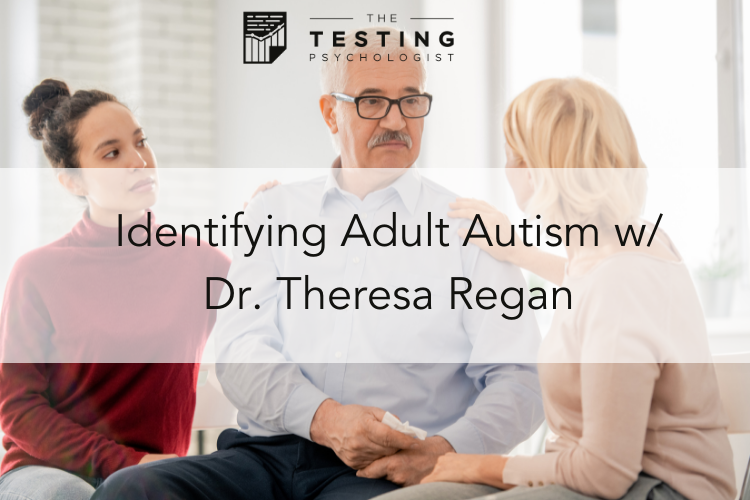In my mastermind groups and individual consulting sessions, I get a lot of questions about hiring. Many folks are interested in expanding but are unsure of how to do it, which makes sense because it can definitely be an overwhelming process.
231 Transcript
[00:00:00] Dr. Sharp: Hello, everyone. Welcome to The Testing Psychologist podcast, the podcast where we talk all about the business and practice of psychological and neuropsychological assessment. I’m your host, Dr. Jeremy Sharp, licensed psychologist, group practice owner, and private practice coach. The BRIEF-2 ADHD form uses BRIEF-2 scores to predict the likelihood of ADHD. It is available on PARiConnect-PAR’s …
230. Identifying Adult Autism w/ Dr. Theresa Regan
Dr. Theresa Regan translated her personal experience with an autistic child into a passion for helping autistic adults in her neuropsych practice. She’s here today to talk with me about her approach to identifying and assessing adult autism.
230 Transcript
[00:00:00] Dr. Sharp: Hello, everyone. Welcome to The Testing Psychologist podcast, the podcast where we talk all about the business and practice of psychological and neuropsychological assessment. I’m your host, Dr. Jeremy Sharp, licensed psychologist, group practice owner, and private practice coach. The TSCC and TSCYC screening forms allow you to quickly screen children for symptoms of trauma. Both forms …
229. Anticipating Office Space Needs
Whether you’re just starting out or you’re trying to grow, finding office space can be a tricky venture. Many of us assume that we need to leap into full-time office space, but that’s not necessarily the case.
229 Transcript
[00:00:00] Hello, everyone. Welcome to The Testing Psychologist podcast, the podcast where we talk all about the business and practice of psychological and neuropsychological assessment. I’m your host, Dr. Jeremy Sharp, licensed psychologist, group practice owner, and private practice coach. The TSCC and TSCYC screening forms allow you to quickly screen children for symptoms of trauma. Both forms are now …
228. Making Meaning with Your Clients: Translating Millon Theory into Clinical Impact w/ Dr. Seth Grossman & Dr. Robert Tringone
I am honored to have Dr. Seth Grossman and Dr. Robert Tringone on the show today to talk about the Millon family of instruments. Not only were Robert and Seth personally connected to Ted Millon for many years, they’ve continued to play major roles in the development and authorship of the instruments and those oh-so-nuanced interpretive reports.
228 Transcript
[00:00:00] Dr. Sharp: Hello, everyone. Welcome to The Testing Psychologist podcast, the podcast where we talk all about the business and practice of psychological and neuropsychological assessment. I’m your host, Dr. Jeremy Sharp, licensed psychologist, group practice owner, and private practice coach. The BRIEF-2 ADHD Form uses BRIEF-2 scores to predict the likelihood of ADHD. It is available on PARiConnect-PAR’s …
227. Writing a Stellar Job Ad
Anybody else having a hard time finding clinicians? In my talks with other practice owners around the country, it seems like EVERYONE is struggling to hire. There are many reasons that I believe this is happening, but what it means for us as practice owners is that we have to do more to set ourselves apart from the other employment options out there.
227 Transcript
[00:00:00] Hello, everyone. Welcome to The Testing Psychologist podcast, the podcast where we talk all about the business and practice of psychological and neuropsychological assessment. I’m your host, Dr. Jeremy Sharp, licensed psychologist, group practice owner, and private practice coach. PAR offers the RIAS-2 and RIST-2 remote, to remotely assess or screen clients for intelligence and in-person e-Stimulus books for …





